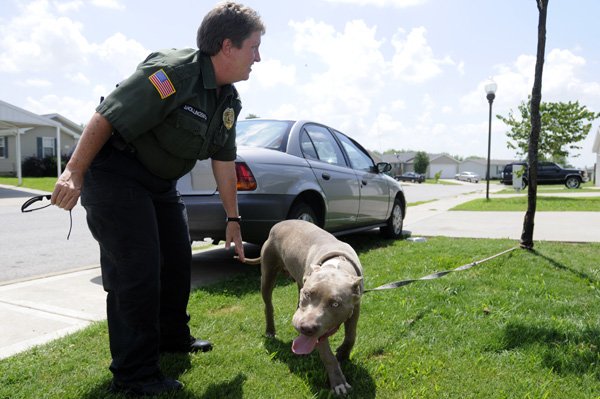NORTHWEST ARKANSAS — The suspects most often pursued by police in Northwest Arkansas tend to be furry and four-legged.
A small force of animal control officers throughout the region handle a high percentage of the call volume that involves various types of critters. Calls are up, but the number of control off cers isn’t rising to match.
“It’s our number one type ofcall by far,” said Maj. Rick Hoyt of the Washington County Sherift ’s Off ce.
Animal calls accounted for 14 of 74 calls to the sherift ’s off ce during one three-day period in July, and 19 of 92 calls through another threeday stretch. Of 17,418 total calls so far this year, 692, or 4 percent, were entered as animal-related. Many other calls classified as roadway hazards also show loose horses or cattle as the problem.
Other jurisdictions are also feeling the crunch, with few animal control offcers, a tight budget and a steadily increasing demand.
Fayetteville shelter director Justine Middleton thinks four animal control off cers would be better than the current three, but saw earlier this year how hectic things could get when they had to get by on just two off cers.
“We’d love to have another off - cer. We were stretched way too thin earlier this year when we had to hold a position open for budgetreasons, and our three ACOs really keep busy as it is.”
Fayetteville and Springdale have both moved to staggered shifts for animal control. That’s keeping at least one officer available more hours each day, but stretching thin when call volume surges, said Capt. Ron Hritz of the Springdale Police Department.
“Calls are heavy, but not enough to justify another position in this upcoming budget cycle. In good times, we’d ask for another slot, butno way I’d ask for it right now,” Hritz said. “It’s not unbearable now that we’ve gone to the split shifts.”
The split shifts mean more hours covered, but fewer offcers on duty at any given time, said Chris Harriman, a Fayetteville animal control off cer.
“I suppose it feels like we have had more calls due to having less officers on the road. Last year we would have three trucks on the road all day long, whereas now we rarely have two,” Harriman said.
One of Washington County’s two animal control officers is out on extended medical leave, so some animal calls are taken by patrol off - cers. Sometimes, it’s as simple as helping get horses or cows back in a field. Other times, patrol off cers actually return to the sherift ’s off ce to tradeout a squad car for the animal control truck because they need the specialized equipment inside, he said.
“We’re lucky to have some folks on patrol who’ve worked animal control in the past, so we can go to them when we need a little help,” said Capt. Dallas McClellan, who oversees patrol and animal control operations for the off ce.
The 2,966 animal calls so far this year in Fayetteville appear to represent a drop of about 5 percent from last year, but the city no longer logs regular patrols as a “call” as they did in the past, Harriman said. True animal calls are increasing slightly, he said.
Springdale’s 2,935 calls so far this year is almost 6 percent higher than the same time period last year.
Data for Springdale and Washington County show most animal-related calls come in between 7 and 10 a.m. Many of those are really callsthat were received overnight, but held until animal control offcers arrived the next morning, according to off cials.
Sometimes there are even questions as to who has responsibility for an animal. Tontitown and Washington County signed an interlocal agreement several years ago to provide police protection in Tontitown using deputy sheriffs. Because animal control is part of the sherift ’s off ce, animal calls from Tontitown have been handled by county animal control off cers. Now, the county wants to be reimbursed for the cost of picking up animals inside city limits.
Tontitown is the only city where the Sheriff ’s Office handles animal control duties, Hoyt said. Other cities either use city employees or don’t have animal control.
Washington County doesn’t want to ofter a similar deal to other small towns, because of manpower limitations andbecause difterent cities have dift erent regulations regarding animals, Hoyt said.
Stray cats or dogs and loose horses or cattle aren’t the only animals the officers sometimes encounter. Washington County animal control off cers had to seek help from Arkansas Game & Fish Commission officers in 2004 to capture an alligator that had taken up residence in a rural stock pond.
More recently, the city animal control offcer in Prairie Grove seems to be spending a lot of time lately chasing what look like black cats with white stripes down the back.
“Ever since breeding season, we’re getting all sorts of calls about skunks,” said Larry Oelrich, city utilities manager. “They’re just awful this year for some reason. That’s been a pretty big chunk of the calls we’ve sent over to the police department. Dogs really haven’t been an issue.”
News, Pages 1 on 07/26/2010

